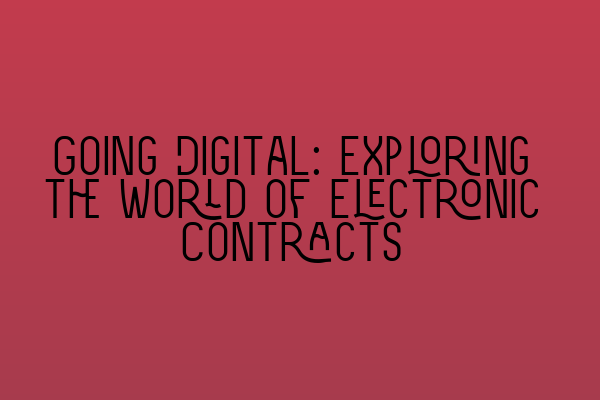Going Digital: Exploring the World of Electronic Contracts
Welcome to the digital era, where paperless operations and digital transactions are becoming increasingly common. In this blog post, we will dive deep into the world of electronic contracts and how they are reshaping the legal landscape. As a solicitor, it is crucial to stay up-to-date with the latest trends in contract law in order to provide the best possible legal advice to your clients.
The Rise of Electronic Contracts
With the advent of technology, traditional pen-and-paper contracts are rapidly being replaced by electronic contracts. An electronic contract, also known as an e-contract, is a legally binding agreement created, signed, and stored electronically. It eliminates the need for physical documents and allows parties to enter into contracts remotely, cutting down on time, costs, and paperwork.
Electronic contracts can take various forms, such as email exchanges, website terms and conditions, click-wrap agreements, and digital signatures. They are recognized and enforceable under the law, provided certain requirements are met. These requirements usually include the parties’ clear intention to create a legally binding agreement, an offer and acceptance, consideration, and the ability to identify the parties involved.
The Benefits of Electronic Contracts
There are several advantages to embracing electronic contracts:
- Efficiency: Electronic contracts streamline the contracting process by eliminating the need for physical signatures, printing, and scanning. This not only saves time but also reduces costs associated with paper and ink.
- Accessibility: Electronic contracts can be accessed from anywhere in the world, making them convenient for parties in different locations. It allows for seamless collaboration and quick turnaround times.
- Security: Digital signatures and encryption techniques provide a high level of security, ensuring the authenticity and integrity of electronic contracts. This reduces the risk of fraud and tampering.
- Environmental Sustainability: By reducing the use of paper, electronic contracts contribute to environmental preservation. As a solicitor, promoting sustainable practices can enhance your reputation and attract environmentally conscious clients.
Legal Validity and Enforceability
Electronic contracts are legally valid and enforceable under UK law, provided they meet certain criteria. The Electronic Communications Act 2000 governs the validity of electronic contracts and electronic signatures in the UK. It recognizes that electronic contracts can satisfy the writing and signature requirements of traditional contracts.
However, it is essential to ensure that the formation, execution, and storage of electronic contracts comply with legal standards. Elements such as consent, clear terms, and appropriate signatories are vital in establishing the enforceability of an electronic contract.
Key Considerations for Electronic Contracts
As a solicitor, there are a few key considerations to keep in mind when working with electronic contracts:
- Intention: Ensure that the parties clearly express their intention to create a legally binding contract. This can be done through explicit language or other conduct that demonstrates an agreement.
- Consent: It is crucial to obtain the genuine consent of all parties involved. This can be achieved through electronic signatures, password-protected documents, or other secure digital methods.
- Data Protection: Be vigilant about data protection and ensure that your clients’ personal information is kept secure and in compliance with relevant data protection laws. Implement appropriate security measures to safeguard sensitive information.
- Electronic Signature: Familiarize yourself with the different types of electronic signatures and their legal recognition. Advise your clients on the most suitable type of electronic signature for their specific needs.
- Retention and Storage: Establish proper procedures for the retention and storage of electronic contracts. Ensure that they are easily accessible, tamper-proof, and stored securely for the required retention period.
The Future of Contract Law
The digital revolution is reshaping the legal industry, and contract law is no exception. As technology continues to advance, we can expect further developments in electronic contract practices. It is crucial for solicitors to embrace these changes and adapt their expertise to meet the evolving needs and expectations of clients.
In conclusion, electronic contracts offer numerous benefits in terms of efficiency, accessibility, security, and environmental sustainability. However, it is essential to navigate the legal requirements and considerations to ensure their validity and enforceability. By staying informed and leveraging technology, solicitors can provide cutting-edge legal advice and services in the digital age.
For further insights into legal practice and decision-making, check out Unveiling Real-Life Case Studies: Insights into Legal Practice and Decision-Making.
If you’re curious about solicitor salaries and factors affecting income, take a look at Exploring Solicitor Salaries in the UK: Average Earnings and Factors Affecting Income.
To enhance your client relationship management skills as a solicitor, read Mastering Client Relationship Management: Skills for Solicitors to Enhance Trust and Loyalty.
If you’re considering a law school education in the UK, our article on Pursuing a Law School Education in the UK: Choosing the Right Path for Your Future provides valuable information to help you make informed decisions.
For aspiring solicitors, our guide on Securing Training Contracts: A Roadmap to Becoming a Solicitor offers a comprehensive roadmap to kickstart your legal career.
